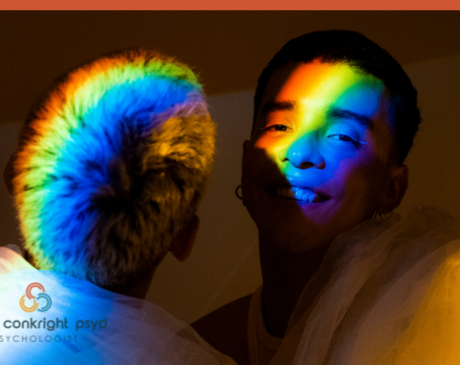5 Questions to Ask Before Your First Couples Therapy Session

Hello There, Couples! Dr. Scott Conkright is Here to Help You Thrive. I’m sharing my top 5 questions to ask before first couples therapy.
As a couples therapist, I’m here to guide you through your partnership’s immense potential for growth and connection. Couples therapy can be a transformative experience, providing a safe and supportive space to address challenges and build a stronger, more fulfilling relationship.
The first therapy session is crucial in your journey towards a stronger relationship. Preparing for this session can make a significant difference. Here are five key questions to consider as a couple, ensuring you make the most of this important meeting:
1. What Do We Hope to Achieve Together?
Clarity is key! Before diving into therapy, getting on the same page about what you’d like to accomplish is helpful. Here are some prompts to get you started:
- Identifying Specific Issues: Are there recurring arguments that get you nowhere? Is intimacy lacking? Perhaps you’re navigating a difficult life transition together. Identifying the specific areas you want to address helps us focus our efforts and tailor the therapy approach to your unique needs.
- Communication Goals: Do you struggle to express yourselves clearly? Active listening may feel like a lost art in your relationship. Setting communication goals allows us to develop tools for more effective and respectful dialogue, strengthening your connection on a deeper level.
- Conflict Resolution Strategies: Do disagreements often escalate into unproductive fights? Discussing your current conflict resolution patterns helps us identify what’s working and what’s not. Together, we can build a toolbox with healthy coping mechanisms and constructive ways to navigate conflict.
- Rekindling the Spark: Maybe the fire feels like it’s slowly dimming. Let’s explore ways to reignite the intimacy and reconnect as a couple. This might involve rediscovering shared interests, planning date nights, or fostering emotional vulnerability.
A clear understanding of your goals allows you to partner with me to create a roadmap for your therapy journey, ensuring a focused and efficient approach.
2. Setting Expectations and Boundaries: Creating a Safe and Secure Space
Open and honest communication is the cornerstone of successful couples therapy. Before your first session, discussing your expectations and boundaries is beneficial to create a comfortable environment where both of you feel safe to speak your truth. Here are some questions to consider:
- Communication Style and Etiquette: How do you prefer to communicate during sessions? Do you want me to intervene when discussions become heated, or would you like some space to work through them initially? Establishing communication protocols helps ensure everyone feels heard and respected.
- Boundaries and Privacy: Are there topics you feel uncomfortable discussing in front of me? Are you comfortable with a certain level of individual therapy alongside our couple’s sessions? Respecting personal boundaries is essential for fostering trust in the therapeutic space.
- Confidentiality and Transparency: Discussing your expectations regarding confidentiality can alleviate any anxieties. It’s important to understand that certain disclosures may require me to breach confidentiality for legal or safety reasons. However, open communication about these boundaries ensures a safe space for honest and vulnerable dialogue.
By setting clear expectations and creating a respectful environment from the outset, we can establish the foundation for a truly transformative therapy experience.

3. Understanding Your Conflict Management Style: Empowering You to Take Control
How you handle disagreements can significantly impact your relationship’s overall health. Reflecting on your current conflict patterns can provide valuable insights and guide the therapy process. Here are some prompts to consider:
- Identifying Triggers and Responses: Are specific situations or behaviors consistently sparking arguments? Reflecting on these triggers helps us identify underlying emotions and develop strategies for managing them more constructively.
- Current Coping Mechanisms: How do you typically react during arguments? Do you shut down, become defensive, or blame each other? Exploring your coping mechanisms allows us to assess their effectiveness and develop healthier strategies for managing conflict.
- Breaking Unhealthy Cycles: Are there recurring patterns in your arguments that leave you stuck? Sometimes, couples get caught in cycles of negativity. By identifying these patterns, we can work together to break free and build new, more positive ways of interacting.
Understanding your conflict management style allows us to develop more effective and respectful communication tools, fostering collaboration and understanding during disagreements.
4. Building on Your Strengths: Celebrating the Good Stuff
It’s easy to get bogged down by problems, but it’s important to remember the foundation of your relationship. Acknowledging your strengths as a couple can build a positive foundation for therapy and remind you of the love that brought you together. Here are some questions to ponder:
- Appreciating Each Other: What qualities do you admire in your partner? What are the things you love most about each other? Expressing appreciation can foster a sense of connection and remind you of the positive aspects of your relationship.
- Shared Values and Goals: What are your core and long-shared Values and Goals (continued)? What are your core values and long-term goals as a couple? Do you share a vision for the future? Identifying your shared values and goals reinforces the foundation of your relationship and provides a sense of purpose and direction as you navigate challenges together.
- Positive Memories and Experiences: Reflect on some of the happy moments you’ve shared as a couple. What are some treasured memories you hold dear? Reconnecting with positive experiences can reignite feelings of love and closeness, reminding you of the strength of your bond.
Focusing on your strengths doesn’t diminish the importance of addressing challenges. It simply provides a balanced perspective and fosters a sense of hope and motivation as you embark on your therapy journey.

5. Commitment: A Journey Best Taken Together
Couples therapy is a collaborative effort. The success of your therapy journey hinges on the commitment of both partners. Here are some questions to explore together:
- Investing Time and Effort: Therapy requires active participation and a willingness to put in the necessary effort. Discussing your commitment level ensures that you are both on the same page about dedicating time and energy to the process.
- Accountability and Support: How will you hold yourselves accountable for implementing the tools and strategies learned in therapy? Discuss ways to support each other throughout the process, creating a sense of teamwork and shared responsibility for the relationship’s growth.
- Openness to Change and Growth: Are you willing to step outside your comfort zone and make changes to improve your relationship? Therapy is a journey of self-discovery and growth. Being open to change will allow you to evolve as individuals and as a couple.
By entering therapy with a shared commitment, you significantly increase the likelihood of achieving your goals and building a stronger, more fulfilling relationship.
Remember, couples therapy is not a magic bullet. It’s a collaborative effort that requires dedication and willingness to learn and grow. But with the right approach and commitment from both partners, it can be a transformative experience, empowering you to navigate challenges, strengthen your bond, and create a lasting, loving connection.
Don’t wait to unlock the full potential of your relationship!
We can develop the necessary tools for a stronger, more fulfilling partnership. I’m here to help anyone looking to deepen their understanding of these concepts or start their journey toward a resilient, fulfilling relationship.
Are you looking for a marriage counselor in Atlanta, GA?
Contact Dr. Scott Conkright today to schedule a consultation.
(404) 315-7150
SCOTT CONKRIGHT, PSY. D., P.C.
I look forward to partnering with you on your journey towards a more fulfilling relationship.



